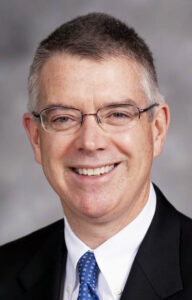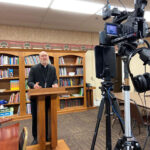By Dr. Tim Millea – Catholic Health Care Today
Over the past several centuries, the practice of medicine has improved steadily and often in dramatic fashion. As the understanding of the body and its functions became clearer, “treatments” such as bloodletting were discarded. Our current health care system is a result of intense scientific investigation that provides “evidence-based” methods of diagnosis and treatment. We are, and should

be, grateful for the many researchers, physicians and others working for our benefit. However, as this explosion of medical knowledge has occurred, an important component of human flourishing is ignored or, worse, rejected.
In a presentation to the St. Thomas Aquinas Guild of the Quad Cities last month, Dr. John Lane of the Mayo Clinic provided a thorough review of the history of medicine and its close relationship to Christianity until the 17th century. At that time, the Age of Enlightenment in Europe initiated a focus on science and reason for the pursuit of knowledge, accompanied by a declining emphasis on the importance and value of religion as a source of human fulfillment.
In our current times, science seems to have completely replaced traditional religion in the field of medicine. As Dr. Lane observes, “The new religion in medicine is scientism,” meaning faith only in reason and facts and not in the metaphysical and transcendent. The irony of that approach is that it ignores scientific studies of the health benefits associated with religious beliefs.
Multiple studies over the past few decades have demonstrated that religious people are statistically healthier as a group, in both body and mind, than those who have no religious affiliation. Among those who attend religious services, a direct correlation exists between better health and more participation in religious activity.
Reports consistently show medical status and physical health as better in religious individuals. Those who regularly attend religious services are less likely to smoke, abuse alcohol, use illegal drugs or have high blood pressure. Recent Gallup surveys have revealed that about 18% of respondents who identified as Catholics are smokers. However, in that group, among those who attended a religious service at least once per week, the number of smokers dropped to 11%. For those respondents who identified as Catholic but never attended any service, the percentage of smokers is 30%.
An active faith life also impacts mortality, particularly in women. A Harvard study of more than 13,500 women evaluated causes of death over a 16-year period. Women who attended more than one religious service per week had a one-third lower chance of dying from any cause, including cardiovascular disease and cancer. Other studies have revealed that religiously involved people live an average of seven years longer than those who are not. Among African-Americans, that difference increases to 14 years.
People’s mental health also appears to benefit from an active faith life. The landmark work of Dr. Harold Koenig and his colleagues at Duke University resulted in the 2012 publication of the “Handbook of Religion and Health.” People who maintain religious affiliations and active participation in their faith consistently demonstrate better happiness, morale and life satisfaction compared to those who do not. In their multi-question “Happiness Survey,” the researchers found that people who attended religious services at least weekly were “very happy” — nearly twice as much as those who never attended services.
Evidence is convincing that an active faith life fosters greater human flourishing. The frequent misconception that science and religion are an “either/or” choice is detrimental to society. Rather, the recognition that the two are best appreciated as a “both/and” contribution to our benefit is necessary. Our Church’s history is replete with Catholic scientists who investigated many questions objectively without bias. One of the earliest of the Church Fathers, St. Clement of Alexandria, recognized the importance of respect for science and faith working together: “I say you’re truly educated if you bring everything to bear on the truth. Taking what’s useful from geometry, music, grammar, and philosophy itself, you guard the faith from assault.”
In our time, St. John Paul II often echoed the wisdom of St. Clement. The Holy Father’s insights are evident in a letter to the director of the Vatican Observatory in 1988: “Science can purify religion from error and superstition; religion can purify science from idolatry and false absolutes. Each can draw the other into a wider world, a world in which both can flourish.”
(Dr. Tim Millea is president of the St. Thomas Aquinas Medical Guild and a member of St. Paul the Apostle Parish in Davenport.)











